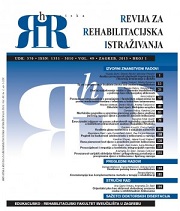Orijentalni ples kao aktivnost slobodnog vremena osoba s intelektualnim teškoćama
Oriental Dance as a Leisure Activity of Persons With Intellectual Disabilities
Author(s): Ana Gajnik Vrđuka, Anamarija Žic RalićSubject(s): Education
Published by: Sveučilište u Zagrebu, Edukacijsko-rehabilitacijski fakultet
Keywords: adults with intellectual disabilities; leisure; oriental dance
Summary/Abstract: It is known that the variation in motor development in persons with intellectual disabilities is partly due to a lack of insufficient biological conditions, as well as undue influence and lack of stimulation of motor activity by the environment. Fostering the acquisition and development of motor skills and abilities in adults with intellectual disabilities can be accomplished in a meaningful and creative leisure activity. One such activity is the oriental dance, for adults with intellectual disabilities may have a psycho-social function in the deconstruction of the excessive energy, training and further development of abilities and skills, increasing motivation for activity, rest and relaxation. This paper presents the application of oriental dance with adults with intellectual disabilities. Seven adults with intellectual disabilities have chosen oriental dance as a leisure activity. Dance workshops were carried out three times a week for three months. A total of 48 dance workshops were held. The program was structured in a way that people with intellectual disabilities could: express personal preferences, make independent decisions, raise the awareness of his own body, to adopt and practice the skills of oriental dance, achieve better mobility, coordination, posture, lateralization and spatial orientation. All users of the program persisted to participate until the end of its implementation. All seven participants have expressed positive experiences during and after the belly dancing program. Adopted new skills, as well as reducing body weight resulted in a sense of pride that users express at the end of the program. Oriental dance program proved to be a suitable leisure activity of these persons with disabilities because suits their interests and abilities.
Journal: Hrvatska revija za rehabilitacijska istraživanja
- Issue Year: 49/2013
- Issue No: 1
- Page Range: 194-204
- Page Count: 11
- Language: Croatian

